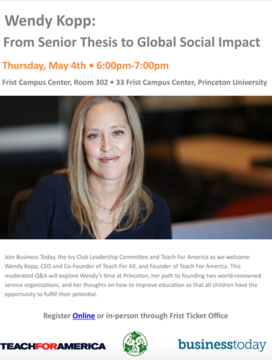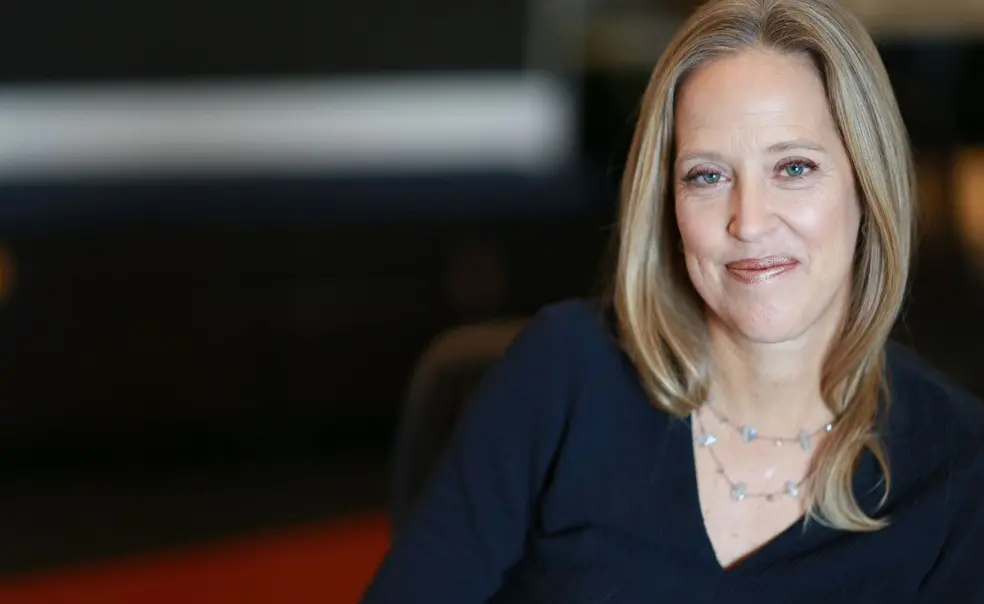Kopp ’89 Discusses Education Reform, Looking Beyond the Classroom
Fixing the education system cannot be done in classrooms alone, Wendy Kopp ’89, the CEO and co-founder of Teach for All, told a campus audience of about 75 students and community members May 4.
“Teach for America’s biggest issue to this day is that people think that [the organization] is about teaching for two years, and that’s actually not the big idea,” said Kopp, whose organization began as the topic of her senior thesis at Princeton, where she concentrated in the Woodrow Wilson School and served as president of Business Today. “It’s about two years and every year after the two years.”
A child’s educational experience can be shaped by poverty, discrimination, and lack of health care, Kopp said. Certain teachers do exceed what's expected of them and are able to meet the needs of these children, she said, but this isn’t always the case — and that’s why this problem cannot be solved in the classroom alone.
Kopp said students, parents, educators, and business people need to come together on the community level to answer the question: What do we want for our kids? Such a conversation would attract both sides of the polarized education debate, she said, and would help people “realize we need to work toward a broader set of outcomes in our schools.”

Asked about how education issues have changed, Kopp responded, “You could name every year for the thing that people decided would solve it.” For the past 10 years, she said, the focus has been on fixing teachers.
“It’s like playing whack-a-mole,” she said. “Every time you solve one thing, it’s another thing that’s holding us back from meaningful progress. The only path is by taking it on in its full complexity, and to do that requires collective leadership.”
One student asked that if the nation’s problems are systematic, why should college graduates not go straight into education policy.
“It’s different to actually work in the system and understand firsthand not only from your experience but from that vantage point of these kids’ experiences, and what the system is doing or is not doing to solve the problem,” Kopp said. “You come out with a much more deeply grounded perspective on the nature of the issues, and also a much different level of conviction about the importance of solving it.”
Today, more than 10,000 Teach for America corps members are teaching as part of a two-year commitment across the country. Teach for All, a network of independent organizations, operates in more than 35 countries. Kopp said building a global network has allowed her to realize that problems in education are similar across countries. “Solutions are sharable,” she said.
About 12 members of Princeton’s Class of 2017 are expected to join Teach for America in the fall.












1 Response
William F. Swiggart ’77
8 Years AgoA few Princeton students and...
A few Princeton students and faculty may be more part of the problem of educational decline than a force for its improvement. Recently, in response to a philosophical paper published in HYPATIA by Rebecca Tuvel, an assistant professor of philosophy at Rhodes College in Memphis, Tenn. (http://onlinelibrary.wiley.... questioning the consistency of leftists' vociferously opposing trans-racial choices while supporting trans-genderism equally vociferously, more than 500 self-identified “scholars” signed a petition (https://gendertrender.wordp...decrying the fact that such questions were being asked in the first place.
Unfortunately, these anti-free-speech academics included Catherine Clune-Taylor, Joshua Rivas, and Gayle Salamon, two Princeton graduate students and one Princeton associate professor.
As long as academics insist on openly shaming people that ask and debate important, tough questions, the quality of education will continue to decline in our society. I can only wish that Princeton scholars not be part of that decline.